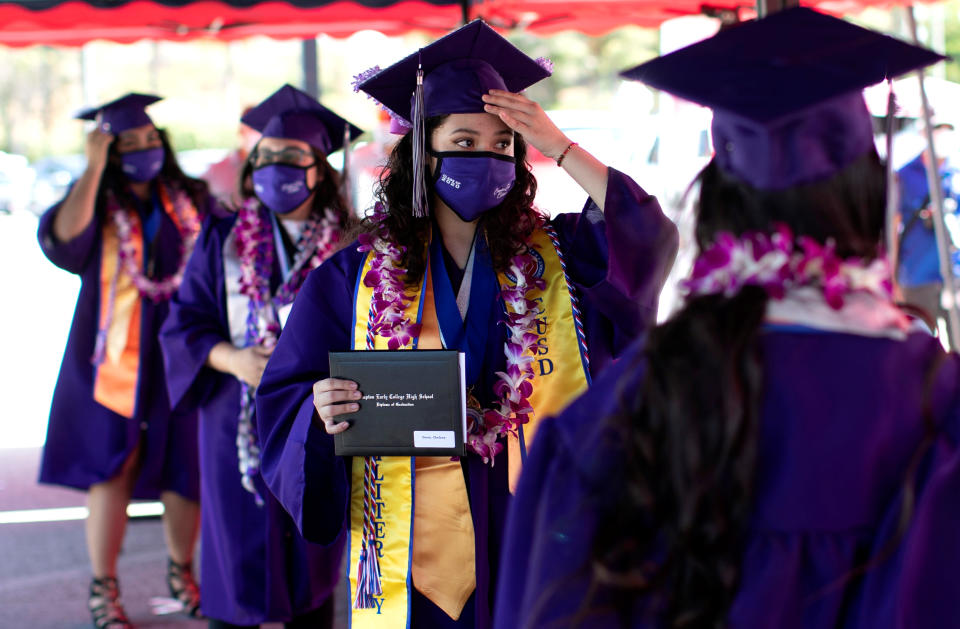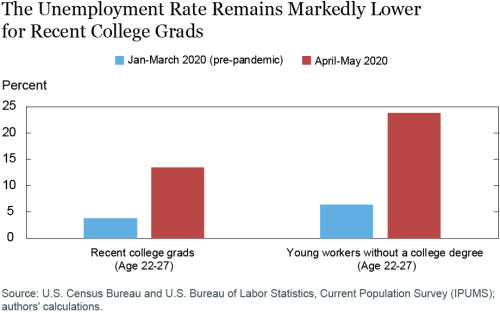Should you take a college gap year amid the pandemic? 'Think twice,' NY Fed argues
Should college students consider taking a gap year as this coronavirus pandemic rages?
NY Fed researchers say “think twice before delaying” in a new blog post.
“Perhaps surprisingly, we find that the return to college actually increases, largely because the opportunity cost of attending school has declined,” the authors stated. “Furthermore, we show there are sizeable hidden costs to delaying college that erode the value of a college degree, even in the current economic environment.”

A gap year ‘damages your entire lifetime earnings profile’
Colleges and universities are being forced to rethink face-to-face learning on campus, and for starting college remotely since paying tens of thousands in tuition sounds unappealing to some.
In a small survey by higher ed consulting firm Art & Science Group in March — prior schools announcing that their fall semesters would be mostly online — 35% of 487 prospective college students said they were thinking of taking a gap year.
In April, in a survey of 1,003 13- to 18-year-olds by Citizens Bank and Junior Achievement, about 44% said that the pandemic had impacted their plans to pay for college — with 27% stating their intention to work instead of starting college.

This intention is associated with the idea that there’s an “opportunity cost” by forgoing wages to study instead of working. But the NY Fed found the opposite: Delaying the start of your career “damages your entire lifetime earnings profile because you miss out on the experience and the extra push that gives your wages over your working life, creating an earnings wedge each year.”
For example, if a student graduates from college in four years at age 22 and earns about $43,000 in their first year on the job by the time they’re 25, the NY Fed estimates that person would be earning $52,000 with three years of experience and raises.
Contrast that with a gap-year-taking graduate who starts their first job at age 23. At the same age at 25, this person would be only earning $49,000 — around $3,000 less.
“Being a year behind, these differences add up each and every year, so that those graduating later never catch up to those who graduated earlier,” the NY Fed researchers wrote. “Together, these costs add up to more than $90,000 over one’s working life, which erodes the value of a college degree.”

‘What isn’t clear is how much of a risk students are willing to take’
College graduates are also likely to be better prepared for the next labor market shock: As seen at the start of the pandemic, workers without a college degree were worst hit by the lockdowns. Furthermore, the authors noted, graduates receive a “college wage premium” in the form of extra wages compared to another worker with just a high school diploma.
And given the currently elevated levels of unemployment, “if you can’t find a job, going to school is less costly.” Some schools are also offering tuition discounts that ultimately bring down the cost of college.

There are sound reasons to consider a gap year amid the pandemic: health and safety concerns, a lack of in-person classes, lack of a “college experience” of being on campus and networking, and the cost of attending college.
“We know that, especially in a downturn, a college degree is still a primary driver of social mobility,” Casey Near, executive director of counseling at College Wise, told Yahoo Finance. “What isn’t clear is how much of a risk students are willing to take and what kind of risk they can endure, both financially and emotionally.”
—
Aarthi Swaminathan is a reporter for Yahoo Finance covering education. If you have a story idea, or would like to share how you are dealing with your decision to go to college, reach out to her at aarthi@yahoofinance.com
Read more:
‘Higher ed is getting hit from all sides right now’: Colleges reel from new immigration announcement
'We've really had to tighten our belt': Cornell pushes ahead with reopening plan
The American teacher crisis is getting rapidly worse amid coronavirus pandemic
Read the latest financial and business news from Yahoo Finance
Follow Yahoo Finance on Twitter, Facebook, Instagram, Flipboard, SmartNews, LinkedIn,YouTube, and reddit.

 Yahoo Finance
Yahoo Finance 
